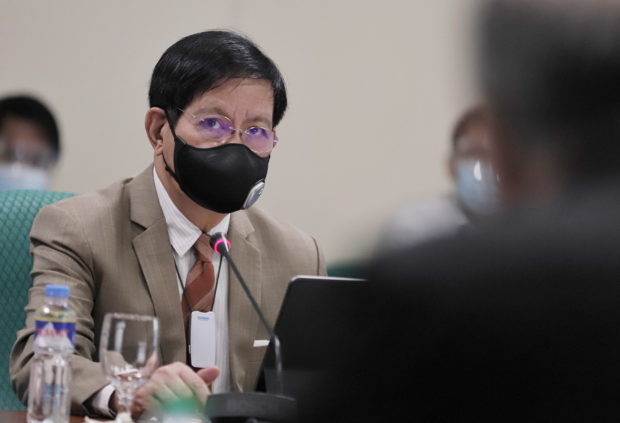MANILA, Philippines — How can the Department of Public Works and Highways (DPWH)’s funding of P67 billion to construct “multipurpose buildings” next year help the country recover from the economic slump due to the COVID-19 pandemic, Sen. Panfilo “Ping” Lacson asked on Wednesday.
During the Senate hearing on the DPWH’s P666.47-billion budget for 2021, Lacson questioned Public Works Secretary Mark Villar about the “pattern” of lopsided allocation for local projects to the detriment of national projects.
Legislators’ intervention
In the DPWH’s detailed budget proposal, the allocation for local infrastructure projects ballooned by P52.84 billion to P229 billion from the original allocation of P176.15 billion, while the allocation for national projects shrank significantly.
Around 30 percent of the allocation for local projects, or P67 billion, will go to multipurpose buildings, Lacson pointed out.
He asked Villar, a former Las Piñas representative, if the changes in the DPWH’s capital outlay next year were due to “intervention from some legislators.”
“My question is, did your late [budget] submission involve intervention from some legislators? Or was it entirely [your] own doing?” Lacson said during the hearing conducted by videoconference.
“I wonder how multipurpose buildings will contribute to the ‘Reset, Rebound, Recover’ theme of the budget,” continued Lacson, the Senate’s unrelenting pork hunter.
Villar said his department’s budget was “adjusted based on “priority projects.”
“With regards to your question regarding the multipurpose [buildings], we also receive many requests from various sectors for these [structures]. If you look at local communities, there is a need to service them somehow,” he said.
“We also want to do pump-priming in the countryside,” he added.
The new budget the DPWH submitted on Sept. 7 was a “mangling” of the original budget contained in the National Expenditure Program (NEP) submitted by Malacañang in August, Lacson said. “I can’t recognize it anymore,” he said.
Villar said the Department of Budget and Management gave the DPWH a budget ceiling in July, so it was not able to prepare the details of the projects in time for the printing and submission of the NEP.
‘Haggling’ by House members
On Sunday, Lacson said the delay in the submission of the DPWH budget could be due to the squabble for the speakership in the House of Representatives.
“They (House members) themselves said there was no equitable distribution of budget in the [congressional] districts,” he said.
Lacson said certain representatives were “haggling” with the DPWH to “preinsert or embed” in the national budget their chosen infrastructure projects to “avoid being detected during deliberations in Congress, especially in the Senate.”
During the hearing on Wednesday, Lacson decried how the DPWH cut the funding originally earmarked for national roads and bridges by billions of pesos, saying such infrastructure projects will impact on national development.
The DPWH reduced the funding for road network development by P21.45 billion to P109.99 billion from the original NEP allocation of P131.44 billion.
The allocation for bridge projects was cut by P6.5 billion to P23.18 billion from P29.73 billion; for flood management projects by P4.5 billion to P84.37 billion; and for asset preservation by P9.81 billion to P46.29 billion.
Lacson also questioned the huge increase in the allocation for right-of-way payments by P24 billion to P36.63 billion from the original P12.6 billion, saying past allocations did not reach this much.
“There’s too much that went to locally funded projects. There’s too much imbalance between local and national projects,” he said.
He said he would question the DPWH budget during the plenary session for amendments.
Pork parking in DPWH budget
For years, Lacson has been watching the DPWH budget for pork, funds that lawmakers “park” in the agency’s spending plan to be channeled to their districts to finance projects designed by favored contractors to give them sizable cuts.
Before the P67 billion for multipurpose buildings, Lacson had flagged P8.2 billion for various military infrastructure projects in the DPWH’s budget.
While the placing of funds for military projects in the DPWH budget was not unusual, he said, he found it “quite irregular” that the same item was placed under two agencies. It creates confusion, he said.
He said similar incidents had happened before, such as the earmarking of funds for public school buildings in the budgets of the DPWH and the Department of Education.
“I had questioned it because it’s confusing, only to be told, although off the record, that allocations for school building repairs and construction were insertions made by some legislators, both congressmen and some senators,” Lacson told the Inquirer on Sunday.
“I can only venture an explanation: It’s contractor-driven,” he added, hinting that the lawmakers may be getting kickbacks from the contractors of the projects.


